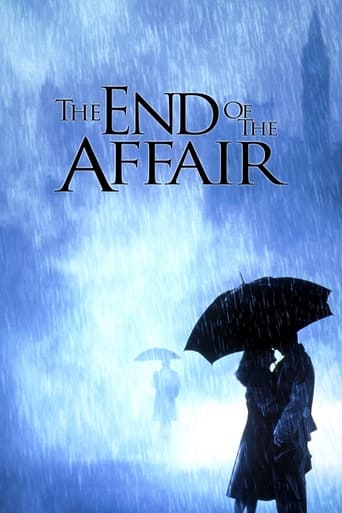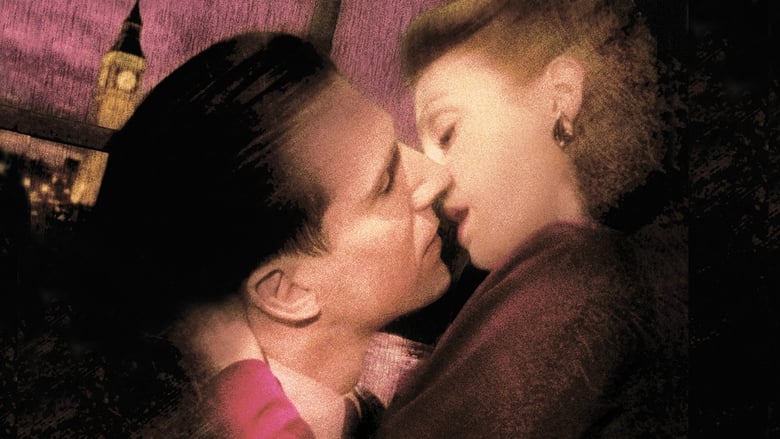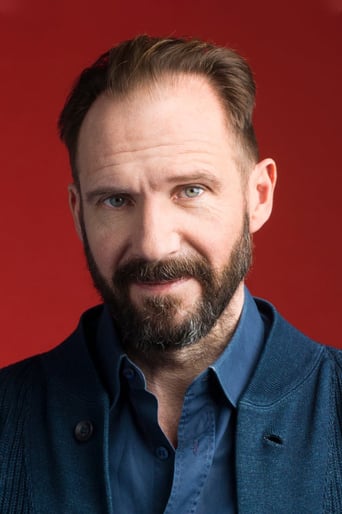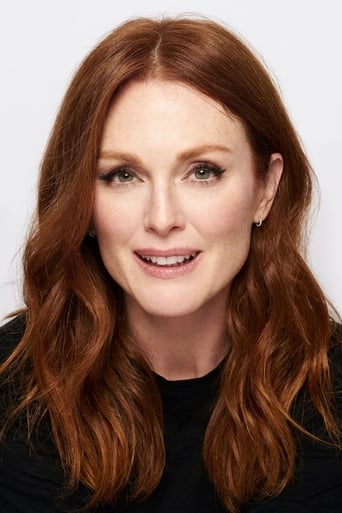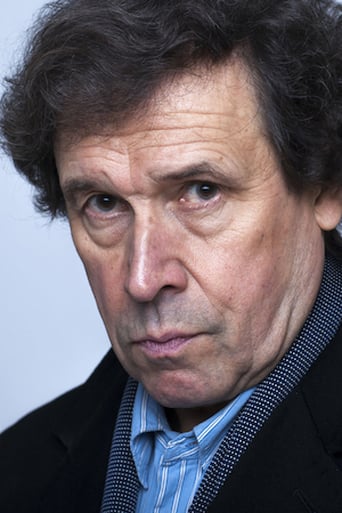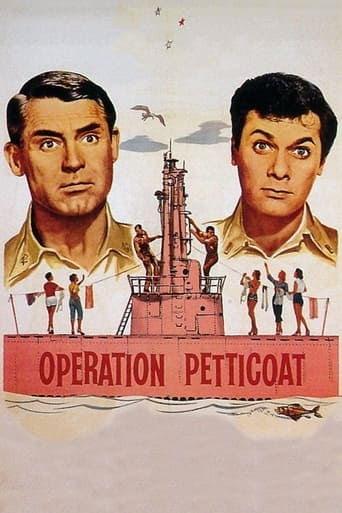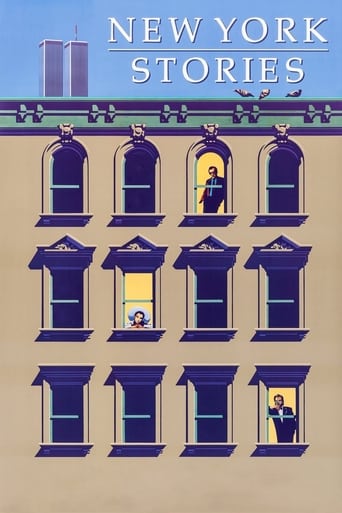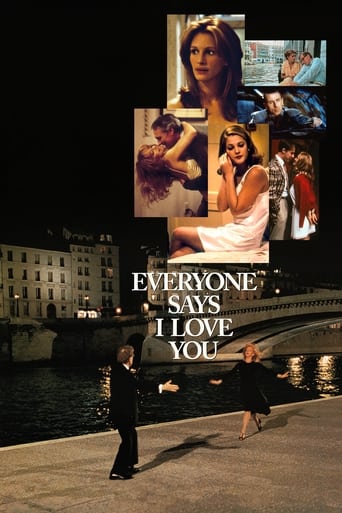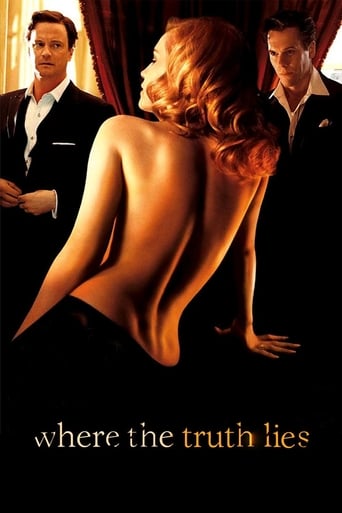The End of the Affair (1999)
On a rainy London night in 1946, novelist Maurice Bendrix has a chance meeting with Henry Miles, husband of his ex-mistress Sarah, who abruptly ended their affair two years before. Bendrix's obsession with Sarah is rekindled; he succumbs to his own jealousy and arranges to have her followed.
Watch Trailer
Cast


Similar titles
Reviews
One of my all time favorites.
Nice effects though.
Don't Believe the Hype
A terrific literary drama and character piece that shows how the process of creating art can be seen differently by those doing it and those looking at it from the outside.
The end of the affair (1999) is a drama film starring Julianne Moore and Ralph Fiennes. Two very talented actors I must say. Moore and Fiennes turn in great performances in this love story. The plot is interesting, it of course focuses on an extramarital affair between Moore and Fiennes. Moore is married, but is basically like a glorified roommate to her husband, no real love, the real love of her life is the man she is seeing behind her husbands back. The tag line on the movie's poster really is true. "The end was just the beginning." That phrase perfectly describes this film, right when the affair ends, things just heat up and get even more interesting. The writing is absolutely magnificent, I just adored the script, especially Julianne Moore's lines, her lines are written so beautifully and they're genuine. The movie is overly long, part of me thought that this movie would be pretty long, but I think the not so extensive length is a good thing for this film in particular. The pacing was nice and I wasn't bored. My mind never wondered and my attention never strayed. Highly highly recommended! 9/10.
There is much to like and admire in this: the script is well-turned, nuanced and may actually be better than the novel in many respects; the photography is perfect in detail and lighting and renders the characters ideally.The music is extremely effective and really underlines the film because it is elegiac; it echoes the past and because memory works in fragments it reminds strongly of those special moments which are gone.It is the direction and performance which give this film real depth and emotional engagement and for anyone who has ever had someone taken or lost, it will resonate.The three main characters are all solemn in their duty, in love, in pain and in regret. It is a technique that works powerfully and is in times with the war period and with the generation that saw life in dutiful and solemn terms. It gives a pitch of authenticity to the film and the casting has worked perfectly as Fiennes does solemn like no one else in the business, and he seems just right as a writer: introverted, analytical, abstract.It is a film,(a novel) and it offers the best of people and a connection to the mystical. The truth of the real affair that provided the basis to the story was not, however; that was debauched and narcissistic, but that fact is not important with this film.
There are faces that cameras like. Ralph Fiennes, for example, in any movie you watch him, whether he is a psycho killer ("Red Dragon") or Voldemort himself ("Harry Potter"), he looks good. If the camera loves you, you don't need to worry because at the end of the day everything will be okay, and I say this because I've never thought of him as a great actor. Again, the camera loves his face but that face says nothing to me. Even more interesting, I've never seen him hit the right chemistry with a female co-star; not with Jennifer Lopez in "Maid in Manhattan", not with Rachel Weisz in "The Constant Gardener". Here, in Neil Jordan's "The end of the affair", the chemistry is not the best with Julianne Moore, but we feel the overwhelming love the movie is trying to express. Has it got to do with other things? Julianne Moore, undoubtedly one of America's best contemporary actresses and one that can do just about anything, plays Sarah Miles, the wife of Henry Miles (Stephen Rea) who falls in love with Maurice Bendrix, the character played by Fiennes.This is the basic establishment of the film, which will revolve around these three characters in what we could define as an 'exploration'. Jordan, who adapted Graham Greene's homonymous novel in a very ambitious script, is great at playing with expectations. The viewer never quite knows when things are occurring and if they are truly occurring: characters wear the same clothes most of the time, scenes and conversations are repeated from different perspectives and flashbacks come out of nowhere. From the very first scene, Roger Pratt's cinematography suggests quite a dreamlike mood; and Michael Nyman's intense score accentuates it. So Jordan develops the characters, makes them talk, shoots them making passionate love in sex scenes that say a lot, works heavily on the looks and everything turns slow, very slow so we can understand this 'affair'; but nothing is ever boring. To contribute to the definition of 'exploration', the film introduces a private investigator as a major secondary character (played by Ian Hart) as both Sarah's husband and her lover in different occasions attempt to investigate her. Turns out Sarah is a woman with a very profound inner world, that translates differently on the outside.This ambivalence is the key of Moore's brilliant performance, and in a film with very few of those we would call moments, she composes a human being we want to understand and we finally do because Moore and the movie gladly help us. There is one scene, maybe the film's only 'moment', in which a siren sounds and Sarah has to leave Maurice. Pay attention at Moore in that precise moment, at everything she does and says before concluding in one simple word: "Yes". What she does can't be described because it must be experienced; and that whole scene in which Fiennes shines like man filled with love, is a scene I'd like to be able to watch frequently as it occurs to me with scenes in movies that represent pure, perfect acting (I recall one scene with Winona Ryder and Cher in "Mermaids" do you remember?).The portrayal of Stephen Rea as Sarah's husband Henry is also crucial, because his character needs to appear as completely naive and insubstantial, and it's not easy to sustain that image for two hours. Rea really seems like an anonymous guy in the world. Fiennes' work on the other hand expresses the monumental love I was just talking about. His character is a writer, and as Sarah's lover, he finds a new meaning for love every day, and astonishes her with how he puts it in words. Henry and Maurice are two jealous men, of the same woman; and it will be the writer who will at one point tell Henry: "Lovers are jealous, husbands are ridiculous", resuming in this way their fundamental difference. I still haven't talked about God; about another part of the definition of 'exploration' that is related with exploring the faith. It is not a minor subject of the movie and it's implicated in some of the things I've said in this review, but I'll leave it for you to discover that plot line and relate it with the things I admired about this very ambitious piece. A piece you could see as a story about an affair, as a tale about love, as a character piece, or more concretely expressed and interesting: the story of two men united by the love they felt for the same woman. Would you go see a film promoted like that? Everything is possible.
Based on a Graham Green novel (which had been filmed previously with Van Johnson and Deborah Kerr in 1955), this story of tortured love is beautifully appointed and creatively directed, but also tends to be very one note and dour. In WWII England, Fiennes is a handsome author who is using statesman Rea as a research subject for an upcoming book. When Rea shows little interest and hasn't much available time, he suggests that Fiennes spend some time with his wife, Moore, in order to get her viewpoints of his life and career. Unfortunately, this leads to a hot and heavy affair as Fiennes awakens passions in Moore that Rea hasn't ever even tried to ignite. The couple enjoys a clandestine romance, meeting frequently in less-populated buildings during the Blitzkrieg and creating their own fireworks until one day, following a particularly nasty explosion, Moore refuses to see Fiennes again. The reasons why are shrouded in mystery as both Fiennes and the audience attempt to uncover what has changed and why. Fiennes is understated, but good, in his depressed role and doesn't shy away from the surprisingly vivid love scenes. Moore looks incredible throughout, her hair, face and figure melding beautifully with the period clothing and hairstyles. She also gives a varied and compelling performance, sporting a British accent that has few faults (one of them being her pronunciation of the word "God", for some reason.) She, like Fiennes, has no problem conveying the physical lust of her character. Rea is effective, but displays the same hangdog expression for virtually the entire movie. Hart enjoys a captivating and amusing role as a dogged private investigator with some interesting methods and conjecture. Isaacs, who would later play a vicious villain in "The Patriot", does what he can with the fairly colorless role of one of Moore's confidantes. The film has a lovely look to it, rain and all. The settings are attractive, the clothes are fine, the camera-work is creative, as is the editing and the atmosphere is, at times, palpable. However, the downbeat material is presented in a way that has very little variety or relief. This somewhat plodding approach (not helped by the overriding, insistent score by Michael Nyman) may be off-putting to viewers who aren't captivated by the stars or who aren't invested in the mystery. Ditto the religious angle, which makes its presence known eventually. Fans of tormented romance stories should find it enjoyable.

